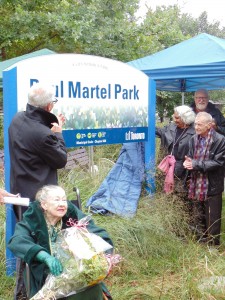Energy efficiency is the lowest hanging fruit on the environmental front
By Terri Chu
Everyone is waiting nervously to see what the future of Honest Ed’s will hold for us. In addition to the importance of onsite electricity generation which I wrote about last month, it would be fantastic if combined heat and power could be included in these plans too. Electricity generation produces a lot of waste heat. In a lot of places in the world, that heat is captured and put to use. That “waste” heat is often put into what’s called a “district energy system”.
District energy can often result in substantial energy savings thanks to higher efficiency heating and chilling equipment (in general, they are better maintained than those in stand-alone buildings). Only in Canada would we have an electricity generating station located beside a warehouse where one vents excess heat to the atmosphere while the other burns natural gas for space heating!
When compared to most of Europe, Canada seems very far behind in terms of energy efficiency. Part of that is no doubt thanks to our abundance of cheap and plentiful resources. It has been a bit of a mixed blessing. At the same time as cheap energy has allowed us to prosper, the resource trap we find ourselves in will severely curtail the next generation’s ability to do the same.
Ever since the oil crisis four decades ago, Scandinavia has been investing heavily to reduce their reliance on imported oil. Sweden in particular has led the way with district energy systems. As a primer, district energy simply refers to a thermal grid. It works much the same way as any other grid such as natural gas or electricity. In this case, we take large pipes and send hot and/or cold water down them for buildings to use for heating and/or cooling. When both heating and cooling is involved, four pipes are needed. Needless to say, the investment can be quite substantial.
Scandinavia has figured this out and has dramatically dropped their energy consumption. In Toronto, we have a few projects (notably Regent Park in Toronto and Enwave’s Deep Lake Water Cooling System), but growth of the systems has been very slow. Attempts to build such a system for the waterfront condos did not go so well.
Depending on who you ask, you will get a different story as to who is to blame.
District energy requires high density to be economically viable for us until we, like Sweden, can achieve economies of scale and build systems at a much lower cost. There are communities who are looking at incorporating district energy into neighbourhood plans. Project Neutral, a local group aiming to create net zero carbon communities, has been a very vocal proponent.
District energy systems need allies in the community. Residents need to be aware that there are alternatives to having natural gas furnaces burning in individual homes. We are so used to having them right in our basements that we have adapted to the risks that come with them. A natural gas leak can cause asphyxia and poor ventilation can cause carbon monoxide poisoning. These risks can be reduced by eliminating the furnace and taking heating energy from a thermal grid instead.
For me, it is frustrating to see Toronto, with all its density, take next to no political leadership in this area whereas communities like Guelph and Markham have already put many kilometres of pipe into the ground. Energy efficiency is the lowest hanging fruit on the environmental front. As residents of high density neighbourhoods, we should be championing innovative solutions that will make our homes and communities more energy efficient. For the benefit of our growing city, make sure your leaders understand that a low carbon future is important to you.

Long-time Annex resident Paul Martel (pictured at right) The
former Ecology Park on Madison Ave., just north of Bloor, has been
renamed in his honour. Through his efforts and the efforts of others,
an empty lot became an oasis of tall grasses, shrubs, wild flowers and
shade trees.
BRIAN BURCHELL/GLEANER NEWS
